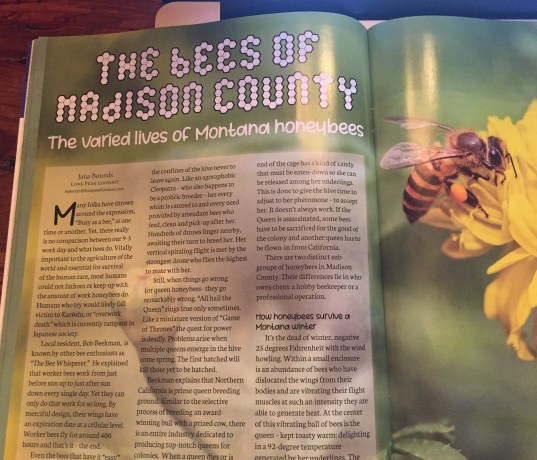Bees, Trees and Water

Bees, Trees and Water
Without them we would all die
Preserve them with care
All God’s Creation
“Loving One Another” is not just about loving people; it is about loving and caring for all of God’s creation. The plants and animals, and all of nature cry for our attention.
How do you show your love for God’s creatures?
Gotta Love Those Beekeepers!
My husband, Bob, is a retired beekeeper. But, like I say about teachers, “Once a teacher, always a teacher,” well, that’s the case with beekeepers as well.
Beekeepers may sell their hives, trucks, and forklifts, and retire from the work, but the spirit of the hive stays with them forever! We moved from California to Montana and took no hives with us. But there are bee hobbyists right here in Ennis – and it didn’t take long for Bob to find them. He was drawn to them the way a bee is drawn to a nectar source!

And, as you know, honeybees have been in the news a lot lately. Bees world-wide are in peril. It’s called CCD = Colony Collapse Disorder. Researchers are busy trying to figure out why whole colonies are dying and beekeepers are losing sometimes up to 1/3 of their hives.
Great Interest in Veteran Beekeepers’ Knowledge
The hobbyist beekeepers, many of whom are new to the scene, appreciate the expertise of veteran beekeepers. Bob was more than happy to lend a hand and get himself back into the groove that was a part of his childhood and a huge portion of his working life.
Jana Bounds, a reporter with the Lone Peak Lookout, was asked to do an article in a local magazine titled, “The Loop.” She contacted Bob and interviewed him. He took her to the site of a local hobbyist beekeeper and spent time describing the situation.
What’s the Problem?
In a nutshell, (or honeybee cell, as the case may be), the problem of disappearing bees is complex, multi-faceted, and not easily labeled. In her article, Jana Bounds quotes my husband, Bob Beekman, as well as Alex McMenamin, PhD student at Montana State University. Both agree, factors like inadequate nutrition, habitat loss, agrochemical exposure, and pathogens are cause for high bee losses.
But, the greatest threat is the Varroa mite. They suck the blood of the larva and spread disease among the bees in the hive. Scientists continue to research, looking for solutions.


Check out “The Loop” Summer edition, 2019, pages 36 to 39.
It is published by our local Madison County newspaper, The Madisonian.
What Can We Do?
Not many of us are retired beekeepers who can help with hands-on experience. But, we can read and learn, and do our part to help lend support to our beekeepers.
- Buy local honey
- Plant flowers and trees that provide good nectar and pollen sources
- Bees need to be near a water source – keep water pure – don’t pollute
- Teach children about the value of honeybees (one in every three bites of food we eat is directly or indirectly dependent on bees and their gift of pollination)
- Avoid use of harmful pesticides
- Support bee-friendly legislation and research
Beekeepers never die – they just lose their stingers!
Hah! 😉
This is Bob in his younger, beekeeper days:

Bee Well – Bee Happy – Bee Sweet – Eat Honey!!

See ya tomorrow





Comments on: "Bees, Trees, and Water" (8)
🙂 we support our local honey farm……..love this post Jan, bless you.
Thank you for visiting, responding, and buying local honey! 🍯 ❤️👍🏽
🙂 my pleasure!
So wonderful to know Jan that your Hubby took care of Bee’s.. His love of them is obviously in his blood and so pleased he also found others who were interested where you moved to..
We plant Bee friendly plants in the home and in the allotment plot and were thrilled when we had a couple of wild bumble bees nest under the shed in the allotments.
We have to look after our bees and we do not use any sort of pesticides or chemicals on our garden or veggies..
Great post to read and lovely to see your pictures Jan
Thank you, Sue. You’re a God-send. I wish more people were as conscientious.
Great post Jan. It I wonderful to see Bob sharing his expertise with others. Your information added more to my knowledge of bees and their future.
Thank you, Derrick, for reading and commenting. I’m glad I added to your knowledge-base. That was part of my intent, of course!
You are welcome Jan. Best wishes to you and your husband this weekend from the Buckeye State. (Richard)